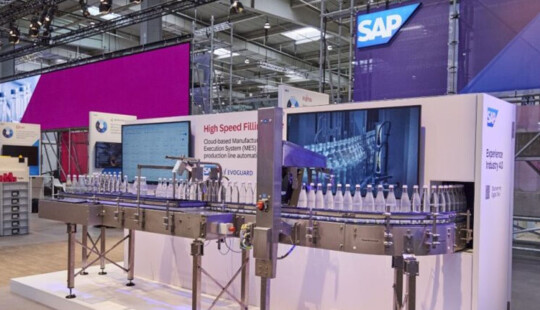Sometimes a difficult starting point is the best driver for real improvement. “When we began the project in 2023, our initial situation was challenging,” recalled Christian Vogler, an SAP enterprise architect at medical product manufacturer Raumedic AG. “Our existing manufacturing execution system was set to an end of life in 2025, with extended software support until 2028.” Vogler, who is project lead for SAP S/4HANA and SAP Digital Manufacturing, spoke about his company’s SAP Digital Manufacturing implementation project in a session at the SAP booth at the Hannover Messe industrial trade fair.
Based in Germany, Raumedic designs, develops, and produces polymer- and silicone-based solutions for customer-specific medical and pharmaceutical applications, as well as products for intensive care. It offers a variety of products ranging from a single medicine tube to more complex systems such as kits for liver transplants or infusions. This diversity brings about very complex production and assembly processes. The company has over 70 years of experience in the industry; its more than 1,300 employees work in five locations in Europe and the U.S.
Making the Shop Floor More Efficient
A manufacturing execution system (MES) is a comprehensive, dynamic software system that monitors, tracks, documents, and controls the process of manufacturing goods from raw materials to finished products. Providing a functional layer between enterprise resource planning (ERP) and process control systems, an MES gives decision-makers the data they need to optimize production and make manufacturing plants more efficient. This is especially relevant in the highly regulated market Raumedic operates in.
The company’s MES strategy stagnated due to the old MES reaching the end of its life cycle. “We could not plan any further rollouts in our plants in the U.S. and Estonia. We had no support to get new change requests for innovation in our system, no usability improvements, and finally no AI scenarios could be implemented,” Vogler said.
Avoiding Wrong Decisions
When evaluating and choosing the right software partner for its new MES, Raumedic needed to avoid the wrong decisions of the past, Vogler explained. “We wanted a strong provider with a future-proof solution and an excellent partner network in the background,” he said. The company’s vision was to set up a basis with its new MES solution and develop it toward a digital production platform. For its five production plants, it was also important to work with a global template approach.
Raumedic’s project team opted to rigorously test the cloud-based SAP Digital Manufacturing solution and, in March 2023, started the proof-of-concept phase. The team began with a small, discrete industry and assembly scope for the pilot plant in Germany and planned to use this blueprint as an accelerator for the worldwide rollouts and implementations.
The employees in the pilot plant were very motivated because the new solution could not only relieve them of time-consuming routine tasks, but also help ensure compliance both now and in the future. With their previous system, employees still had to document on paper every quality management and GxP compliance process – GxP refers to the many “good practice” guidelines and regulations that apply to organizations that manufacture products consumed or used by humans or animals. The new SAP system could handle all this digitally, saving time and increasing compliance. In Raumedic’s regulated market environment, regulatory compliance is a strategic advantage that enhances market access, builds trust, mitigates risks, and attracts investment.
Concept for Long-Term Success
After rigorous testing, the team concluded that the solution was ready for the company’s complex production processes. “We collected over 300 requirements and evaluated them for possible usage in 2024,” Vogler said. “I am very proud that we implemented 75 requirements into a demo landscape.” He said that the team carried out the end-to-end manufacturing execution process with an integration of one use case from the shop floor. They got the confirmation for the production planning with all relevant production values back to the system. “The result was very convincing, and so at the end of last year our top management confirmed SAP Digital Manufacturing as our new MES solution.”
As a next step, a global template will be set up and implemented in a process-oriented manner via SAP ERP Central Component (SAP ECC). The go-live is planned for Q1 2025. In parallel, SAP ECC will be transformed to SAP S/4HANA by 2026, using the Cloud Integration capability within SAP Integration Suite, and rolled out to the other plants.
“SAP Digital Manufacturing is our central, future-proof, state-of-the-art MES solution. It forms the basis for securing Raumedic’s strategic goals in the production environment and adds value to all our business processes,” Vogler concluded.



